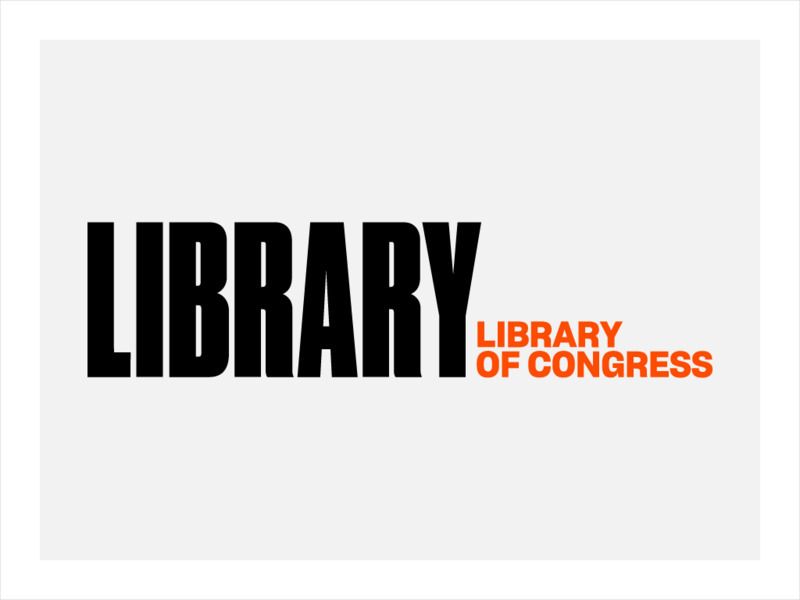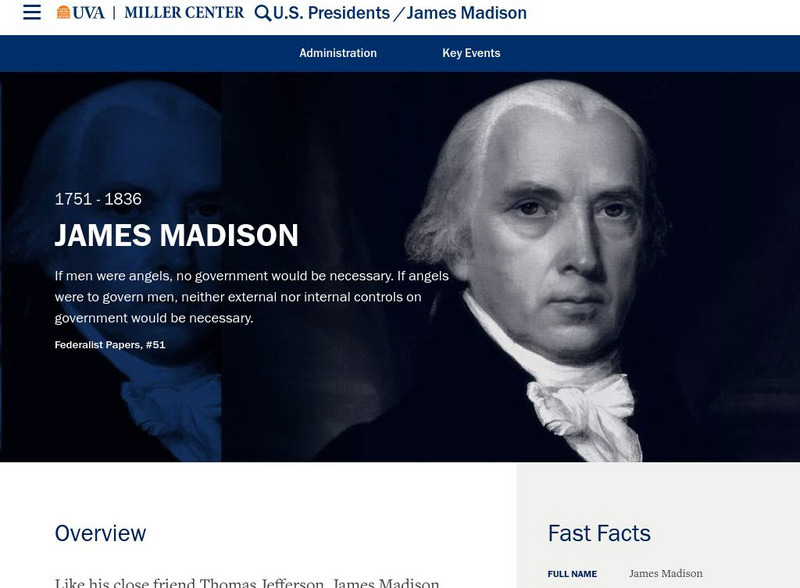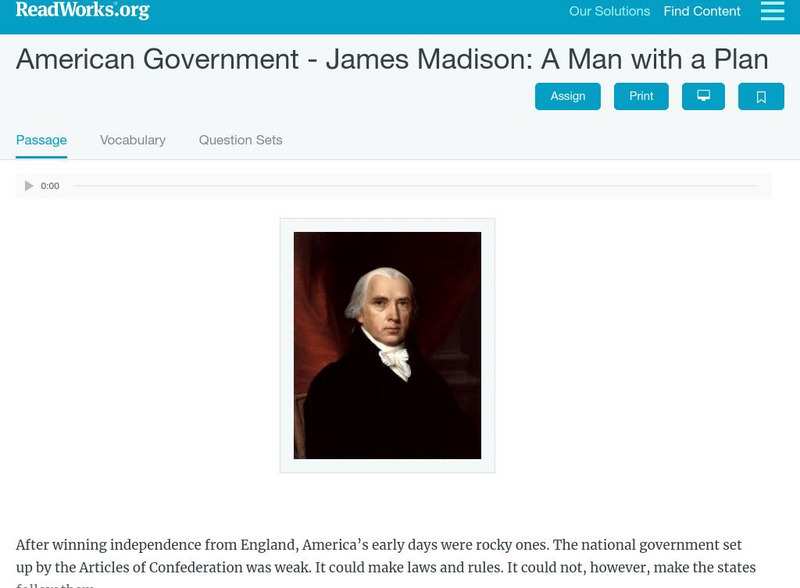Hi, what do you want to do?
Curated OER
Civil War Sites and Battlefields in Arkansas
Modern day and historic images grace an informative presentation. Learners can review multiple battles and effects of the Civil War on the state of Arkansas. Major sites and battle fields are shown as they looked in the past and as they...
Curated OER
The Monroe Doctrine: U.S. Foreign Affairs (circa 1782-1823) and James Monroe
Learners read the test of the Monroe Doctrine then list the key points and discuss its central tenets.
Curated OER
The First American Party System: Events, Issues, and Positions
Students identify factors which lead to the development of the Federalists and Democratic-Republicans. They examine the writings of Thomas Jefferson and Alexander Hamilton as well. They discuss what elements are needed for an orgainized...
National Endowment for the Humanities
The Monroe Doctrine: A Close Reading
Students identify specific passages in the Monroe Doctrine to events in early U.S. diplomacy.
Curated OER
A Lesson To Accompany "The First Bank of the United States: A Chapter in the History of Central Banking"
Here is an interesting topic. Learners examine the economics that led to the founding of the First Bank of America. They participate in a reader's theater experience depicting the debate between Alexander Hamilton and Thomas Jefferson...
Curated OER
The U. S. at War
High schoolers examine reasons for going to war. In this foreign policy lesson, students analyze the reasons the U.S. entered the the War of 1812, the Mexican War, the Spanish-American War, World War I, World War II, the Korean War, the...
National Endowment for the Humanities
Lesson 2: The Debate in Congress on the Sedition Act
Pupils research and discuss the provisions in the Constitution that supported the arguments for and against the Sedition Act. They articulate objections to and arguments in favor of the Sedition Act.
Curated OER
Jefferson Administration
Pupils research the major domestic issues that were present during the administration of Thomas Jefferson including the acquisition of the Louisiana Territory, Lewis and Clark's expedition, and his foreign policy. They investigate...
Curated OER
The Two-Party System in American History: Ch 5
Five matching and 5 multiple choice questions to challenge your class. Their answers will test their knowledge of early American government. Party systems, Electorate, and major constituents of the time are the topics included.
Curated OER
American Foreign Policy Since World War II (The Cold War)
Students identify and interpret some key figures and major events during the Cold War era, including the Korean War, Vietnam, Cuban Missile Crisis, Bay of Pigs Invasion, and the United States and China Cold War Relations. They also play...
Curated OER
Matching Events and People
In this social studies events worksheet, students match important events in history with people that were involved at the time. Students complete 13 matches.
University of Groningen
American History: Presidents: James Madison
Included are James Madison's two inaugural addresses, his State of the Nation speeches, as well as other writings related to the Constitution. Of particular interest is his speech of 1812.
Library of Congress
Loc: Presidents as Poets: James Madison
An account of President James Madison's brief stint as a poet. Includes the text of his poem "A poem against the Tories".
University of Virginia
Miller Center at Uva: u.s. Presidents: James Madison: Campaigns and Elections
Scroll through this article to find an account of the election of 1812 in which James Madison was running as the first war president.
University of Virginia
Miller Center at Uva: u.s. Presidents: James Madison
The Rector and Visitors of the University of Virginia provides an extensive biography on the life of James Madison. Provides information about his life before and after the presidency as well as his policies on foreign and domestic...
Read Works
Read Works: American Government James Madison
[Free Registration/Login Required] This nonfiction passage contains biographical information on "Father of the United States Constitution" and former United States President, James Madison. This passage is a stand-alone curricular piece...
University of Virginia
Miller Center at Uva: u.s. Presidents: James Monroe: Life Before the Presidency
Scroll through this article on the events of James Monroe's life before he became President, to find information about his actions as Secretary of State and Secretary of War in James Madison's Cabinet.
Curated OER
Educational Technology Clearinghouse: Clip Art Etc: James Madison
President James Madison, who served as the Secretary of State under Jefferson for eight years.
Digital History
Digital History: The New Nation [Pdf]
Many problems existed for the new United States. Read about issues facing George Washington as the new President, and find out about the major successes of the first Congress. [PDF]
Curated OER
Educational Technology Clearinghouse: Clip Art Etc: James Madison
The fourth President of the United States. He was co-author, with John Jay and Alexander Hamilton, of the Federalist Papers, and is traditionally regarded as the Father of the United States Constitution.
Soylent Communications
William Henry Harrison
The ninth President of the United States was a General during the War of 1812. He lead forces at the Battle of Tippecanoe, and in 1813 reversed the losses of General William Hull. As Governor of Indiana Territory he acquired a large...
Curated OER
Educational Technology Clearinghouse: Clip Art Etc: Dolley Todd Madison
The wife of President James Madison. She acted as First Lady of the United States of America while Thomas Jefferson was in office because he was a widower.
US Department of State
Biographies of the Secretaries of State: Robert Smith (1757 1842)
Biography in brief of Robert Smith, who served as Secretary of State under President James Madison from March 6, 1809, until April 1, 1811.
Bill of Rights Institute
Bill of Rights Institute: Constitution of the United States of America (1787)
The Constitution was written in the summer of 1787 in Philadelphia, Pennsylvania, by delegates from 12 states, in order to replace the Articles of Confederation with a new form of government. It created a federal system with a national...
























